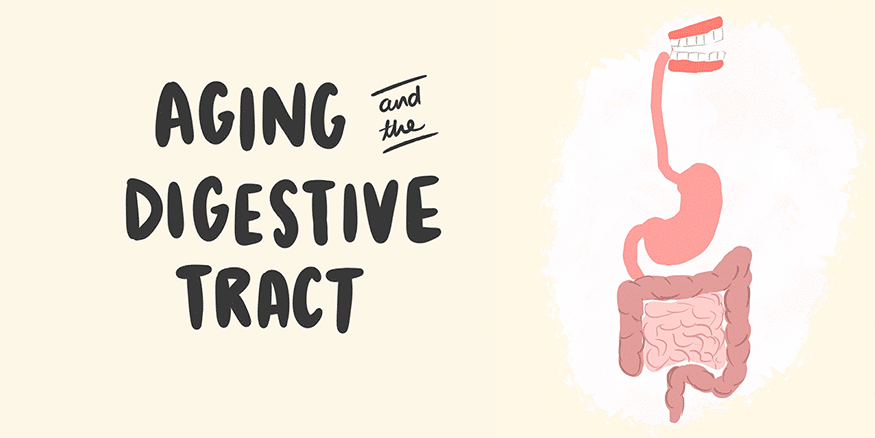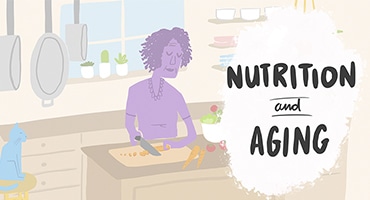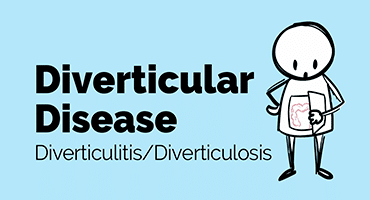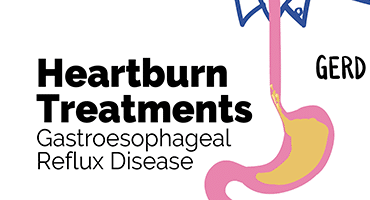
Aging and the Digestive Tract Video
Featuring
James R. Gray, MD, CCFP, ABIM, FRCPC
Gastroenterologist
Clinical Professor, University of British Columbia
Chair, Medical Advisory Council,
Gastrointestinal Society and Canadian Society of Intestinal Research
Video Transcript
The digestive tract is a complex system, and aging can affect any part of it, from gum to bum.
If you already have a GI condition, such as inflammatory bowel disease, irritable bowel syndrome, constipation, celiac disease, or GERD, then your symptoms from these conditions might change, get better, or worsen as you become older. There are also GI conditions with a higher incidence in seniors.
Differences result from decades of influencing factors such as diet, lifestyle, medications, disease, overall health, and the aging process itself. For these reasons, it is important to understand that, you might experience fluctuations in the way your gut functions. Some of these are normal, and others indicate conditions that need to be addressed.
Starting at the top of the digestive tract, you might have trouble swallowing, also known as dysphagia. This can occur for a variety of reasons, including trouble with proper chewing because of dental changes or muscle weakness, inadequate saliva production, reduced strength in the upper esophageal sphincter, impaired coordination of the swallowing process, and degeneration of nerves and muscles, which usually results from another condition, such as Parkinson’s or a stroke. If you have difficulty swallowing, then chewing your food well, eating slowly, maintaining good dental health, remaining seated in an upright position while eating, and wearing properly fitted dentures, if applicable, can all help.
You might find that you experience heartburn more often as you get older. This can be a result of gastroesophageal reflux disease, also known as GERD. In this condition, the sphincter between the esophagus and the stomach, known as the lower esophageal sphincter, doesn’t close properly, allowing stomach contents to splash up into the esophagus. This can cause pain and damage the esophagus because it doesn’t have a protective lining, like the stomach does, and isn’t meant to have so much contact with stomach acid. Aside from the gnawing pain of heartburn, GERD can also cause general chest pain, a persistent sore throat, acid or food regurgitation, chronic cough or throat clearing, and bad breath.
If you frequently experience upper abdominal pain, nausea, belching, bloating, early fullness, and indigestion, then you might have a condition called dyspepsia. It is very common, affecting about 20-45% of the population, and becomes more frequent with age. While we don’t know what causes this condition, some possible influencing factors include GERD, ulcer disease, hiatus hernia, inflammation, food allergies, diet and lifestyle, or the use of non-steroidal anti-inflammatory medications, often referred to as NSAIDs, such as aspirin, ibuprofen, and naproxen.
We typically use the same treatment options to treat both GERD and dyspepsia. This includes diet and lifestyle changes, such as eliminating trigger foods, quitting smoking, and losing weight if necessary, as well as medications to either neutralize or suppress stomach acid.
Going back to NSAIDs, it is common for older individuals to use more of these medications because they effectively relieve pain, especially inflammatory pain, such as from arthritis and various injuries. They are also non-narcotic, so they offer pain relief without any impact on our ability to live our day-to-day lives. However, these medications can damage the GI tract, leading to ulcers, bleeding, and perforation of the stomach. You are at particular risk for damage from NSAIDs if you are elderly, have had prior GI bleeds, are using steroid medications, have cardiovascular disease, or if you use a large dosage or mix multiple types of NSAIDs. However, it is possible to still take these medications while reducing your risk of complications. Some types of NSAIDs are less damaging to the gut, and you can take lower dosages or alternate between them and other medications, such as acetaminophen. Taking medications that reduce your production of stomach acid, such as a proton pump inhibitor, can also help.
Moving on to bowel habits, it is important to understand that what is normal for each individual is a bit different, but there are some general guidelines to help figure out if what you experience is ideal. Healthy bowel habits involve passing a bowel movement anywhere from three times a day to three times a week, as long as the stool is well-formed and passes comfortably. If your stools are loose and watery, urgent, and you go more than three times a day, then you might have diarrhea. If your stools are lumpy and hard, and you find yourself straining, then it might be constipation. The Bristol Stool Chart is a helpful tool to figure out if your bowel movements are healthy.
Diarrhea affects 7-14% of seniors and there are many causes, such as infection, medication side effects, lactose intolerance, celiac disease, irritable bowel syndrome, and inflammatory bowel disease. There are two types of medications that can help reduce diarrhea. These include medications that soak up water in the bowel, such as fibre supplements, and medications that alter muscle activity in the intestine to slow down transit time, such as loperamide. However, most treatments for chronic diarrhea involve addressing the underlying cause. Contact your doctor if you have diarrhea that lasts for more than a few days.
About 23% of Canadians between 65 and 93 years of age experience constipation, compared with only 15% of the general population. If you have constipation, you might go many days without having a bowel movement and, when you do, it might be hard, firm, and difficult to pass. You will likely experience rectal pressure or fullness, bloating, abdominal pain, and a sensation of incomplete evacuation. Constipation can also lead to poor appetite, back pain, and general malaise. The most common causes of constipation include a low fibre or fluid diet, inadequate exercise, a medication side effect, irritable bowel syndrome, or another condition, such as diabetes, stroke, hypothyroidism, or Parkinson’s. Some individuals have chronic constipation with no identifiable cause. There are many treatment options for constipation, depending on the cause, but in general, eating enough fibre and drinking enough fluids, taking your time in the bathroom, getting adequate physical exercise, safe use of laxatives, and proper sitting position on the toilet can all help. It is best to keep your feet slightly elevated on a block or book and lean forward to mimic a squatting position while you go, as this can put the muscles and bowel in a better position.
Another condition of the colon is diverticular disease, also called diverticulosis. This occurs when small sac-like out-pouchings on the lining of the colon balloon through the outer colon wall. Diverticular disease primarily affects the elderly. In fact, 65% of seniors who are 85 years or older have diverticulosis, compared to 50% of those older than 60 and only 5% of those younger than 40. Typically, there are no symptoms, but in 10-25% of cases, a flare occurs. During a flare, called diverticulitis, the diverticula become inflamed and/or infected. Symptoms of diverticulitis include an increase in diarrhea, abdominal cramping, bowel irritability, bleeding, bloating, fever, and intense pain and tenderness, particularly in the left lower portion of the abdomen.
Treatment for this condition depends on the current status of the disease. If you have asymptomatic diverticulosis, which you might have been diagnosed with during a routine colonoscopy, the best treatment is maintaining a balanced diet with adequate fibre, drinking plenty of water, and getting a moderate amount of exercise. If you have a diverticulitis flare, then you will likely need to take antibiotics to clear up any infection and follow a temporary low-fibre or liquid diet to allow the bowel time to rest and heal. In some severe cases, you might need surgery to remove the affected part of the bowel, but this is rare.
As you age, you might find it difficult to stay active. This can lead to weight gain and obesity, which can have further negative effects on your health and increase your risk of developing many age-related conditions, such as heart disease and type 2 diabetes. Trying out some low-impact activities, such as gardening, yoga, water aerobics, and going for short walks, can help.
In addition, alcohol can slowly damage your liver over time, which means that older individuals are at an increased risk of developing alcohol-related liver disease.
Finally, the most concerning disease for the aging population is colorectal cancer. This is still quite rare, with a lifetime risk of only 5-6%, but it is important to get regular screening, since it is easy to treat in the early stages but can be deadly if caught late. Colorectal cancer grows slowly; it typically takes 15 years from the first signs of a polyp to the formation of colorectal cancer. Current recommendations are that individuals between the ages of 50 and 75 years get a colonoscopy about once per decade or have biannual stool tests and then, if positive, a colonoscopy.
Most digestive symptoms indicate mild problems that are easily treatable. However, if you experience rectal bleeding, unplanned weight loss, fever, or nocturnal bowel movements, speak with your physician, as these symptoms might indicate more severe disease.




